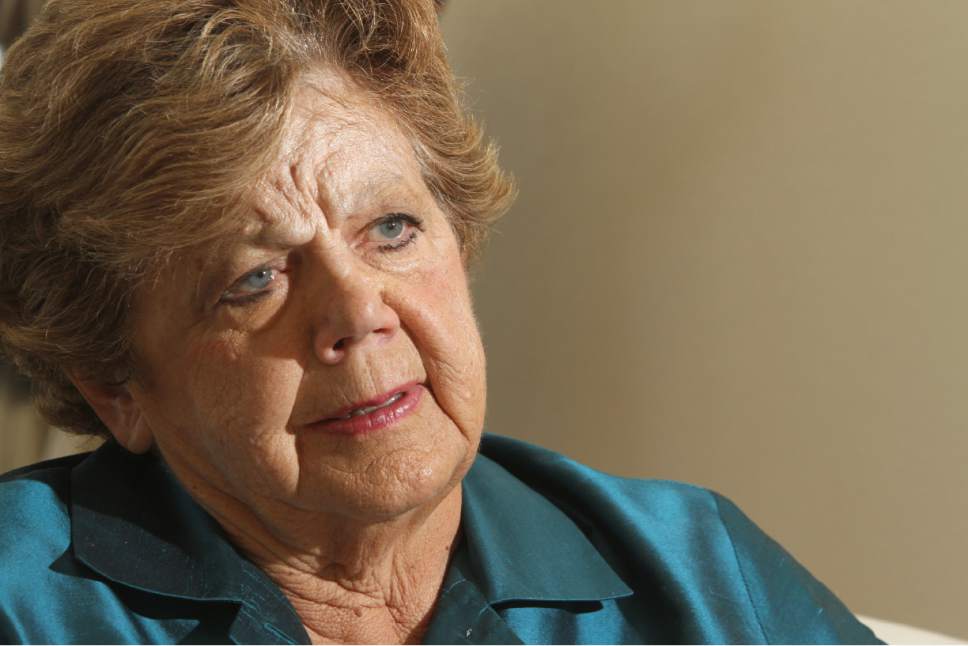This is an archived article that was published on sltrib.com in 2015, and information in the article may be outdated. It is provided only for personal research purposes and may not be reprinted.
When a tornado ripped through the heart of Salt Lake City 16 years ago, my reporter's instincts kicked in and — despite being a columnist — I wanted a piece of the story.
While other reporters gathered assessments of damage and casualties and focused on the freak nature of a deadly twister in Utah, I sought ways to contribute.
I headed up to the state Capitol, where the whirlwind storm had ripped out numerous trees on the grounds.
As I walked inside, I spotted then-Gov. Mike Leavitt sprinting toward the nearby State Office Building, where an emergency command center was housed in the basement.
Figuring that is where the news would come from, I followed the governor until he entered the room, and I was stopped at the door.
"Only authorized personnel," said a somewhat-unfriendly Utah Highway Patrol trooper guarding the entrance.
Undaunted, I returned to the Capitol to see if I could find someone who would have details on the damage.
I then encountered Lt. Gov. Olene Walker, who was walking out of her office and, as usual, greeted me warmly and briefly exclaimed her shock at the extraordinary storm.
"Where are you going?" I asked.
"I'm on my way to the emergency command center," she said. "Can I come with you?" I asked.
"Sure."
As we approached the entrance where Officer Not-So-Friendly was standing sentry, he gave me a stern look, angry that I would have the audacity to try again to get in there.
He looked as though he was ready to pounce, when Olene (I always called her Olene) said, "He's with me."
The defeated guard slumped back in his chair while I smiled at him and passed into the center, with large screens showing locations all over the city and high-tech communications operations whirling all around me.
As soon as Leavitt spotted me in that sensitive area, however, I was escorted outside and told to wait in the Capitol, where I would be briefed later.
I tell that story of Olene Walker, who became Utah's 15th governor when Leavitt resigned to join President George W. Bush's administration, because it describes her rare qualities as a politician.
She had no guile. She had no paranoia of the media and what damage my presence there might have to security. She was a leader focused on her job and carried no animosity or suspicion of anyone.
If I wanted to tag along and witness the spectacle of the state's sophisticated emergency-response apparatus, why not?
Olene, whose funeral is Friday at noon, stood out as the first and only woman governor in Utah history. She was the only governor to earn a doctorate, which she achieved while serving in the Utah Legislature, rearing children and helping to guide the family's snack food business.
She also was the first governor — and I would assume the last — to hug me whenever she saw me.
Olene combined a loving, almost naive "Aunt Bee" demeanor with a halting, uneven speaking style in a high trill voice that belied her keen, analytical mind that often led political foes to underestimate her abilities.
With education always her top priority, she pushed through funding for an early-reading program to give young students a head start — despite reluctance from a Republican-dominated Legislature. When she threatened to veto the budget bill if it didn't include that funding, lawmakers saw her resolve and included the money.
She decided in 2004 to run for governor in her own right after completing Leavitt's third term, but ran into Utah's peculiar nominating system.
That year, the GOP delegates were strongly represented by home-schoolers, private-school advocates and others suspicious of public education. Endorsing vouchers to subsidize private-school tuition with public tax money became the litmus test for candidates seeking the governor's seat.
Jon Huntsman Jr., who later proved he was no big fan of vouchers, nevertheless told delegates that he would support a voucher bill.
Olene, true to form, said she would not, because she didn't.
The result: The sitting governor, with an 84 percent approval rating, was dumped by the delegates at the Utah Republican Convention, and Huntsman eventually won the prize.
So the general populace, who loved her, never got a chance to vote for her. And that makes her a personification of what is wrong with Utah's caucus-convention nominating system.



